Guanajuato Consolidated Mining and Milling Company
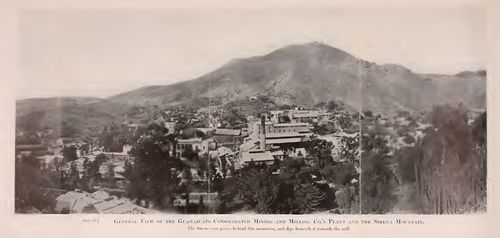
General view of the Guanajuato Consolidated Mining and Milling Co.'s plant and the Sirena mountain
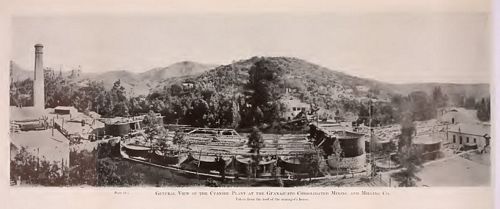
General view of the cyanide plant taken from the roof of the manager's house
The Guanajuato Consolidated Mining and Milling Company was incorporated in Colorado in 1898 with a capital of three million US dollars to take over and work the Sirena mine, situated on the Veta Madre of Guanajuato. The company gradually and persistently purchased additional property until, by 1906, it owned at least six times the area of mining property that it originally possessed. It also owned 10 per cent of the Concordia and Rayas Company, one of the largest companies operating on the Veta Madre, north of the Sirena mine, a milling plant and other interests.
It issue notes in accordance with the authorization dated 3 August 1914CEHM, Fondo XXI Venustiano Carranza, carpeta 12, legajo 1207. Existing examples are for 10c, $1, and $10.
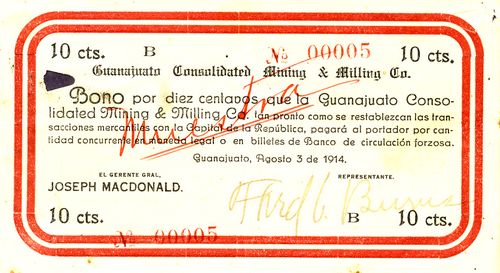
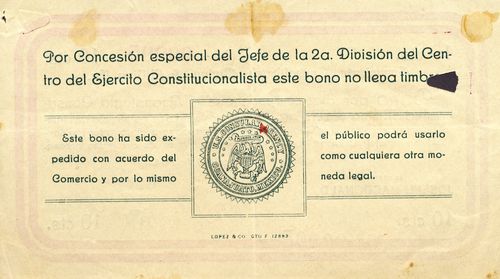
M1770 10c Guanajuato Consolidated Mining & Milling
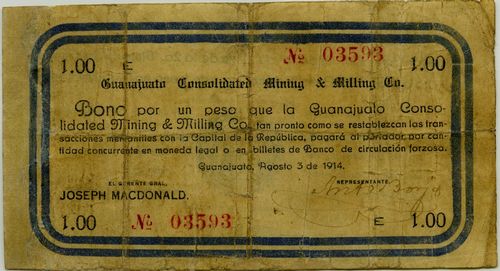
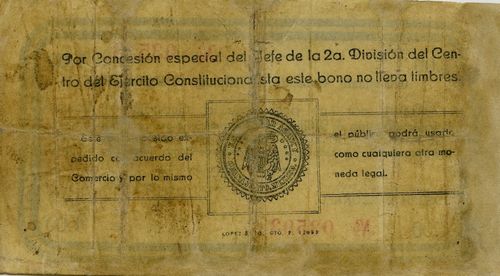
M1771 $1 Guanajuato Consolidated Mining & Milling
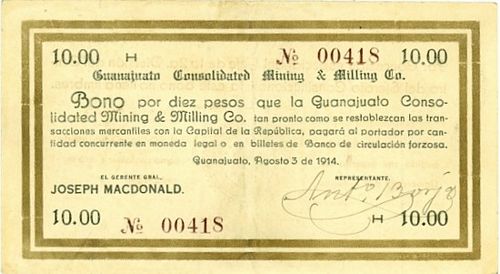
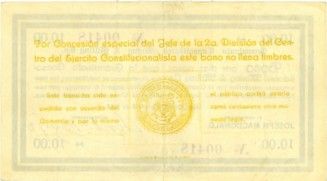
M1772 $10 Guanajuato Consolidated Mining & Milling
| Series | from | to | total number |
total value |
||
| 5c | A | |||||
| 10c | B | 00001 | includes numbers 00005 and 5263 | |||
| 25c | C | |||||
| 50c | D | |||||
| $1 | E | includes numbers 8343 to 03593 | ||||
| $2 | F | |||||
| $5 | G | |||||
| $10 | H | includes number 00418CNBanxico #11059 | ||||
| $65,000 |
The notes have the following printed or handsigned signatures.
|
Joseph MacDonald (1856-1939) was a wealthy mining engineer and executive. He worked at the Avalon Smelter in British Columbia, and then in various mines in Gem, Idaho; Juneau, Alaska and Mexico. On 14 May 1902, while he was managing the Treadwell Mines in Juneau, Alaska, MacDonald shot and killed religious fanatic N.C. Jones because Jones, a missionary, believed God had instructed him to make sure the sabbath was observed. The operations at Treadwell, the largest gold mine in existence when in operation, only closed down for Christmas and Independence Day. Jones and MacDonald had already had confrontations about closing on Sundays and efforts were being made to keep Jones away. However, when MacDonald returned home, he was confronted by Jones who was armed and tried to shoot him. MacDonald fired and hit Jones in each arm and twice in the torso which led to his deathOne version. The Mexican Herald reported that “It had been charged that McDonald brained the missionary with a crow-bar.”. MacDonald was originally cleared of wrong doing and continued to run the mine. Then, in early 1907 he took over from his brother, M. E. MacDonald, as general manager of the Guanajuato Consolidated Mining and Milling company. In December 1912, while still general manager, MacDonald was indicted for Jones' murder, ultimately extradited to the United States, tried and on 1 August 1913 found not guiltyThe Mexican Herald, 18th Year, No. 6,545, 2 August 1913. |
|
| Antonio Borja |  |
| [identification needed] |  |
The notes were a temporary measure and on 28 October 1914 the companies issued a notice that they were to be redeemed in their respective offices, giving people five days in which to hand in any notesCrispín Espinosa, Efemérides Guanajuatenses.
By 1 November some public offices and shops had begun to refuse the notes. The local newspaper, El Observador, said that it realized that they were not of forced circulation, but they had been issued with the approval of businesses and the public and did state that the companies would redeem them with legal tender as soon as business communications were restored with the capital of the Republic. The paper was aware of poor people who had not been able to buy necessities, and speculators who were buying the notes at less than face value. It called upon the authorities to actEl Observador, Guanajuato, Año XI, Núm. 895, 1 November 1914.
